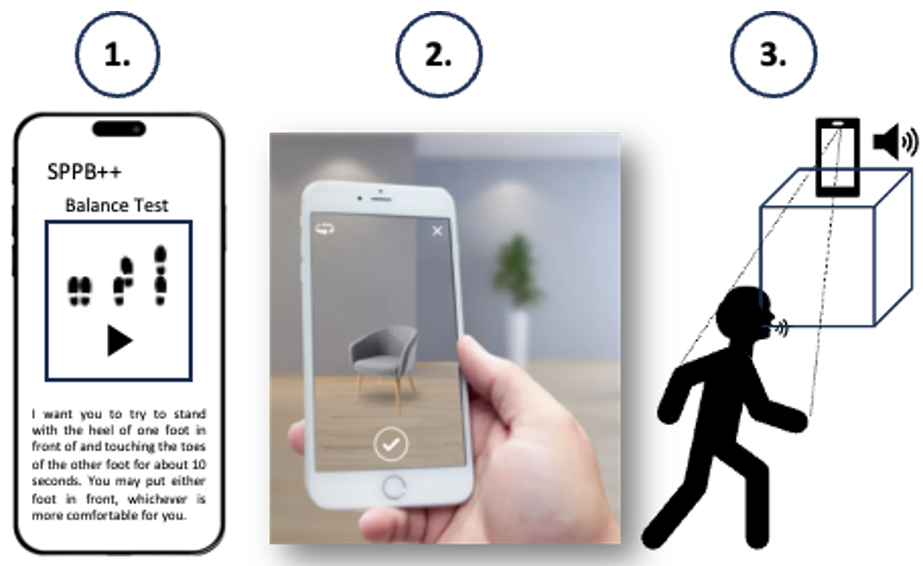MassAITC Cohort: Year 3 (AD/ADRD)

Final Project Accomplishments: This project aimed to develop an objective, computer vision–based tool for assessing physical and cognitive functioning in older adults using the Short Physical Performance Battery (SPPB). Over the course of the project, the team collected video data from both clinical and non-clinical settings, developed algorithms to segment and score physical activities, and created a mobile app prototype to guide users through self-administered SPPB tests. The team successfully gathered data from 45 participants and an external dataset of 189 older adults. The mobile app prototype can be used for recording the gait sequences, as well as procedures for automatically scoring the recorded videos. Preliminary results show high accuracy in activity recognition and promising performance in detecting cognitive decline.
The project also expanded its scope to include user-centered design and usability testing, addressing safety concerns around self-administration by older adults. Feedback led to a pivot in app development, exploring options for caregiver-assisted assessments while maintaining the goal of at-home usability. The team developed and validated algorithms for gait parameter extraction and action segmentation, achieving strong performance metrics and clinical relevance. This project highlights the potential for using computer vision technology to assess and predict risk for cognitive decline in older adults in real-world settings without requiring specialized sensors.
Initial Proposal Abstract: The Short Physical Performance Battery (SPPB) is an established protocol designed to assess lower extremity function and mobility in elderly populations. Traditionally used to predict health outcomes such as disability and mortality, SPPB’s relevance extends into cognitive impairment arenas, particularly Alzheimer’s Disease and Related Dementias (ADRD).
This project proposes the development of a mobile application that facilitates the remote and automated administration of the SPPB tests, enabling frequent, accurate, and non-invasive assessments at home. Our mobile application will guide users through each test, capture performance using the device’s camera, and employ computer vision technology to analyze movements and provide immediate scoring. Data collected from these tests will not only track the progression of physical abilities but also help predict cognitive decline by correlating physical performance with cognitive health markers.
By allowing continuous monitoring and early detection of subtle physical and cognitive changes, the application aims to support timely clinical interventions and adaptive care strategies, thereby enhancing personalized care for ADRD patients. The project leverages expertise from the Stanford Alzheimer’s Disease Research Center and integrates advanced analytics to transform how we approach ADRD monitoring and management.
Outcomes:
- Poster Presentation: a2 National Symposium 2025
 Title: An Objective Assessment Tool for Evaluating Functioning in Older Adults Authors: Narayan Schutz, Anson Zhou, Merryn Daniel, Victor Henderson, Ehsan Adeli
Title: An Objective Assessment Tool for Evaluating Functioning in Older Adults Authors: Narayan Schutz, Anson Zhou, Merryn Daniel, Victor Henderson, Ehsan Adeli - Grant Funding: NIA R01 (R01AG089169)
 Title: Neural mechanisms of gait disturbances as individualized digital biomarker trajectories in preclinical dementia Public Health Relevance Statement: In this project, the research team uncovers the neural mechanisms of gait and mobility disturbances in preclinical dementia and identifies trackable individualized digital biomarkers (from videos). They evaluate the specificity and sensitivity… Read more: Grant Funding: NIA R01 (R01AG089169)
Title: Neural mechanisms of gait disturbances as individualized digital biomarker trajectories in preclinical dementia Public Health Relevance Statement: In this project, the research team uncovers the neural mechanisms of gait and mobility disturbances in preclinical dementia and identifies trackable individualized digital biomarkers (from videos). They evaluate the specificity and sensitivity… Read more: Grant Funding: NIA R01 (R01AG089169) - Publication: Data-driven discovery of movement-linked heterogeneity in neurodegenerative diseases. Nature Machine Intelligence
 Authors: Mark Endo, Favour Nerrise, Qingyu Zhao, Edith V Sullivan, Li Fei-Fei, Victor W Henderson, Kilian M Pohl, Kathleen L Poston, Ehsan Adeli Abstract Neurodegenerative diseases manifest different motor and cognitive signs and symptoms that are highly heterogeneous. Parsing these heterogeneities may lead to an improved understanding of underlying disease… Read more: Publication: Data-driven discovery of movement-linked heterogeneity in neurodegenerative diseases. Nature Machine Intelligence
Authors: Mark Endo, Favour Nerrise, Qingyu Zhao, Edith V Sullivan, Li Fei-Fei, Victor W Henderson, Kilian M Pohl, Kathleen L Poston, Ehsan Adeli Abstract Neurodegenerative diseases manifest different motor and cognitive signs and symptoms that are highly heterogeneous. Parsing these heterogeneities may lead to an improved understanding of underlying disease… Read more: Publication: Data-driven discovery of movement-linked heterogeneity in neurodegenerative diseases. Nature Machine Intelligence - Oral Presentation: Alzheimer’s Association International Conference
 Title: Automated Physical Performance Battery as a Digital Marker for Alzheimer’s Disease and Mild Cognitive ImpairmentPresenter: Ehsan Adeli (PI) Abstract: Historically, screening for incidence of AD-related MCI or conversion from MCI to AD dementia has relied on cognitive, activities of daily living, and brain imaging measures. Limitations of this diagnostic… Read more: Oral Presentation: Alzheimer’s Association International Conference
Title: Automated Physical Performance Battery as a Digital Marker for Alzheimer’s Disease and Mild Cognitive ImpairmentPresenter: Ehsan Adeli (PI) Abstract: Historically, screening for incidence of AD-related MCI or conversion from MCI to AD dementia has relied on cognitive, activities of daily living, and brain imaging measures. Limitations of this diagnostic… Read more: Oral Presentation: Alzheimer’s Association International Conference - Patent: Systems and methods for estimation of Parkinson’s Disease gait impairment severity from videos using MDS-UPDRS
 Many embodiments of the invention include systems and methods for evaluating motion from a video, the method includes identifying a target individual in a set of one or more frames in a video, analyzing the set of frames to determine a set of pose parameters, generating a 3D body mesh… Read more: Patent: Systems and methods for estimation of Parkinson’s Disease gait impairment severity from videos using MDS-UPDRS
Many embodiments of the invention include systems and methods for evaluating motion from a video, the method includes identifying a target individual in a set of one or more frames in a video, analyzing the set of frames to determine a set of pose parameters, generating a 3D body mesh… Read more: Patent: Systems and methods for estimation of Parkinson’s Disease gait impairment severity from videos using MDS-UPDRS - Open Source Software Available: GaitForeMer (GaitForecasting and impairment estimation transforMer)
 The base gait forecasting and estimation transformer model that is leveraged for this pilot is available open-source. Source: https://github.com/markendo/GaitForeMer
The base gait forecasting and estimation transformer model that is leveraged for this pilot is available open-source. Source: https://github.com/markendo/GaitForeMer
